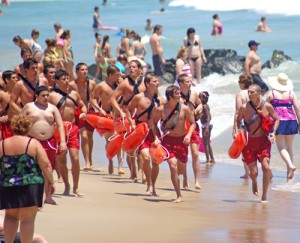
OCEAN CITY — Thirty years after first serving in the Ocean City Beach Patrol (OCBP), Dr. John Cary, now 53, is back on duty.
“Everybody has been really supportive,” said Cary, who added that his family was the first to get behind him when he decided he wanted to get back on the beach.
Cary first sat in a stand back in the early 1980’s. Though he only spent a few summers with the OCBP, Cary recalled it was an incredible time and an important period in his life. He even started his family that’s being so supportive now back when he was a guard in Ocean City.
“My wife and I met at the beach,” he said.
After three summers in the stand, Cary headed off to medical school in 1982 and eventually set up an internal medicine practice in Manassas, Va. The urge to guard never disappeared, he admitted, but had to take a back seat to building a career and family.
“I never had a vacation long enough [to come back],” said Cary.
With his kids growing up and his practice steady, Cary said that he finally began to realistically consider coming back to Ocean City to work in the summer of 2011. Unfortunately, a motorcycle accident and broken collarbone sidelined those aspirations until this year. But last month, for the first time in 30 years, Cary was back in OCBP trunks and going through a week-long Surf Rescue Academy, the beach patrol’s version of basic training.
Carey admitted that training these days is more difficult than during his first guard tenure.
“The run was way tougher … the training was way harder,” said Cary.
Compared to three decades ago, Cary confirmed that OCBP has made a lot of upgrades in many ways. When he used to only need a minimal amount of training and a few days spent observing veteran guards, Cary said that now the bar is set much higher.
“We did 70 hours of training in seven days or so,” he said. “It’s hard but it’s fun at the same time.”
Besides the training, Cary explained that technology and how OCBP uses it is also one of the things most drastically different from the 80’s.
Carey also mentioned the way that crew chiefs were previously tethered to communicating by wired phones where today wireless handheld radios are as common as sunglasses.
One practice that remains in use, however, is signaling through naval semaphore, though Cary theorized that a partial explanation for that could be the practical way semaphore keeps a guard focused.
“One thing I never thought of before is that they say semaphore is a way to keep the guard’s attention,” he said.
OCBP Captain Butch Arbin, who is going into his fourth decade with the organization, agreed with Cary that the agency has made a lot of improvements over the years, but that the core skills, such as physical fitness and extreme attention to detail, remain constant.
“The basic skill, the most basic skill you need is the ‘scan,’” Arbin said. “And that’s not changed at all.”
While Cary was able to meet all of the OCBP physical requirements, including a 300-meter soft-sand run in less than 65 seconds which he did in 63 and a 400-meter ocean swim in less than 10 minutes which he did in 8:37, Arbin said that what really sets Cary apart is the previous experience he’s bringing to the table.
“There’s a certain type of vision that develops,” said Arbin of veteran guards. “You develop that extra sense.”
Though Cary hasn’t sat in a stand for 30 years before this summer, Arbin said he’s kept his skills and is able to beat some of his younger, faster teammates to rescues by applying that awareness.
“It’s about the whole package,” said Arbin.
Vince Martirano, one of the rookie guards who went through the academy with Cary, noted the same awareness Arbin noticed and added that Cary’s medical experience meant he was miles above everyone else when it came to practicing emergency first aid. It was because of that medical history that Martirano revealed Cary was given the nickname, “Doc.”
Martirano admitted that he was amazed by Cary’s ability to keep up with guards half his age. Even when Cary struggled, especially with the grueling 300-meter soft-sand run, Martirano and Arbin were both adamant that nobody used the kid gloves on Cary during training.
“No one cut him any breaks,” said Martirano.
Pat Everett, the first female beach patrol officer, served with Cary in the early 1980’s. Even then, she said he stood out since he was working to be doctor, was married and beginning a family, not exactly typical for a lifeguard in Ocean City.
“He was just a unique guy,” said Everett.
She described lifeguarding as “hours of boredom and seconds of trauma” and had nothing but praise for Cary jumping back into the fray at his age.
Cary called beach patrol “a combination of a serious job and fun on the beach.” Now that he’s passed the Surf Rescue Academy he will be returning throughout the summer on weekends to sit on a stand and actually lifeguard.
“As long as I keep passing the test, I’ll keep coming down,” said Cary.
